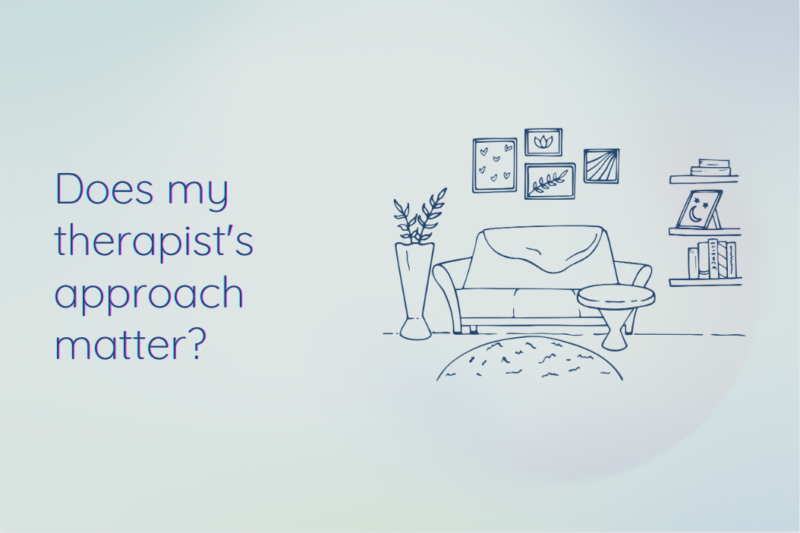Does my therapist’s approach matter?
Andres Carrion | July 2023
When we make the decision to begin therapy, there may be various questions we might have about the process. These questions might include “Does the gender or race of my therapist matter?”, “How often and for how long should I go to therapy?”, “How do I know which therapist is best for me?” But, one of the most common questions asked is whether the therapist’s therapeutic approach matters. In short, yes, your therapist’s approach does matter. Your therapist’s approach sometimes matters depending on the symptoms you may be experiencing. Some treatment approaches are shown to be more efficient for certain symptoms. For example, Cognitive Behavioral Therapy (CBT) is one of the most effective and most common treatment approaches for anxiety. Your therapist’s approach may also depend on your responses to treatment. Therapy is collaborative in nature and sometimes their approach may not work for you – maybe it’s irrelevant or maybe it is not accurately gauging your symptoms. Your therapist’s approach might also be important if you’re looking for something specific. LGTBQ+ affirming and multicultural therapies, for instance, are treatment approaches which help people who identify as LGBTQ+ and/or as a racial minority feel safe and help them open up to their therapist. Therapy approaches matter and for several reasons. However, there are other factors in therapy which may be just as (if not more) important in therapy as your therapist’s approach.
While your therapist’s approach is important in the therapeutic process, the therapeutic alliance is arguably more important. The therapeutic alliance is one of the biggest predictors as to whether therapy will work for you. This refers to how close you feel with your therapist. This alliance encompasses the therapist’s and client’s level of commitment and engagement towards helping the client meet their goals. With a high therapeutic alliance, clients tend to report comfort, safety, and trust with their therapist as well as successful achievement of their goals regardless of their therapist’s approach or treatment modality. We can achieve a strong, positive therapeutic alliance by being open minded, trusting the process, and being honest with our therapists.
Aside from your therapist’s approach and the therapeutic alliance, the most important factors in therapy and the biggest factor for achieving your goals is the work you do outside of therapy. Therapy is hard work, but what is even harder is the commitment you make to yourself to make sustainable changes. This takes both intentionality and determination to get better. Many times, clients attend therapy weekly and have a strong, positive therapeutic alliance with their therapist but may not feel like they are making progress. At the same time, these clients are not setting boundaries, practicing self-care, or doing any of the goals agreed upon in therapy. This is because therapy only works if we do. Our therapists support us the best they can, but it’s up to us to make the real change.
In summary, your therapist’s approach does matter, and it does for several reasons. However, there are other factors in the therapeutic process which may be of greater importance. These include the therapeutic alliance and the work you do outside of therapy. When working towards your mental health goals, it is important to remember that this process is a journey, and it takes time. So, trust the process and ask your therapist for support when needed.
While our physical offices are located in South Loop and Lakeview neighborhoods in Chicago, Illinois for in-person sessions, we also welcome and serve clients for online therapy from anywhere in Illinois and Washington, D.C. Clients from the Chicagoland area may choose in-office or online therapy and usually commute from surrounding areas such as River North, West Loop, Gold Coast, Old Town, Lincoln Park, Lake View, Rogers Park, Logan Square, Pilsen, Bridgeport, Little Village, Bronzeville, South Shore, Hyde Park, Back of the Yards, Wicker Park, Bucktown and many more.
At Roamers Therapy, our psychotherapists are here to support you through anxiety, depression, trauma and relationship issues, race-ethnicity issues, LGBTQIA+ issues, ADHD, Autism, or any challenges you encounter. Our psychotherapists are trained in Cognitive Behavioral Therapy, Dialectical Behavioral Therapy, Psychodynamic Therapy, Acceptance, and Commitment Therapy, Person-Centered Therapy, and Gottman Therapy.
Whether you’re seeking guidance on a specific issue or need help navigating difficult emotions, we’re ready to assist you every step of the way.
Contact us today to learn more about our services and schedule a session with our mental health professionals to begin your healing journey. To get started with therapy, visit our booking page.
First, decide if you’ll be paying out-of-pocket or using insurance. If you’re a self-pay client, you can book directly through the “Book Now” page or fill out the “Self-Pay/Out-of-network Inquiry Form.” If you’re using insurance, fill out the “Insurance Verification Form” to receive details about your costs and availability. Please let us know your preferred therapist. If your preferred therapist isn’t available, you can join the waitlist by emailing us. Once your appointment is confirmed, you’ll receive intake documents to complete before your first session.
This page is also part of the Roamers Therapy Glossary; a collection of mental-health related definitions that are written by our therapists.
While our offices are currently located at the South Loop neighborhood of Downtown Chicago, Illinois, we also welcome and serve clients for online therapy from anywhere in Illinois and Washington, D.C. Clients from the Chicagoland area may choose in-office or online therapy and usually commute from surrounding areas such as River North, West Loop, Gold Coast, Old Town, Lincoln Park, Lake View, Rogers Park, Logan Square, Pilsen, Bridgeport, Little Village, Bronzeville, South Shore, Hyde Park, Back of the Yards, Wicker Park, Bucktown and many more. You can visit our contact page to access detailed information on our office location.

